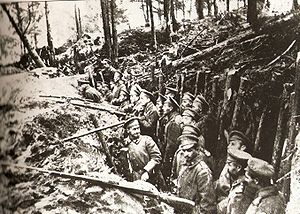Battle of Sarikamish
| Battle of Sarıkamış | |||||||
|---|---|---|---|---|---|---|---|
 Russian trenches in the forests of Sarikamish. partof=the Caucasus Campaign in the Middle Eastern Theatre (World War I) | |||||||
| |||||||
| Belligerents | |||||||
|
|
| ||||||
| Commanders and leaders | |||||||
| Nikolai Yudenich | Enver Pasha | ||||||
| Strength | |||||||
|
Russian Caucasus Army 65,000 |
Third Army 95,000 | ||||||
| Casualties and losses | |||||||
|
16,000 killed 12,000 sick | 75,000 | ||||||
The Battle of Sarıkamış (Russian: Сражение при Сарыкамыше; Turkish: Sarıkamış Harekâtı), also known as The Campaign in Armenia, was a decisive Russian victory over the Ottoman Empire in the Caucasus Campaign during World War I. During the battle, the ill-prepared Ottoman forces suffered as many casualties from Russian opponents as from the winter weather.
Enver’s plan
Following the defeat of Russian troops under Bergmann earlier in 1914, Enver Pasha decided to put into effect a grand plan to destroy the Russian Caucasus Army at Sarıkamış. [1] Through this, he hoped to regain territories ceded to Russia after the Russo-Turkish War (1877–1878). Next, he hoped this would facilitate a revolt of Caucasian Moslems, opening the route to Tbilisi and beyond.
The plan found sympathy with German advisors, as success would mean diversion of Russian forces to this front[1]. However, senior Turkish commanders seriously opposed this, as the commander of the 3rd Army was forced to resign due to his opposition of the plan.[1]
Initial Turkish assault
The general offensive began on the 22nd of December, headed by Enver Pasha[1] . A frontal attack by the X Corps of the 3rd army was to be supported by the IX and X Corps. Enver started the campaign with some 95,000 troops against the understrength 65,000 men of the Russian Caucasus Army.
Inadequate preparations
The Turkish forces were inadequately prepared for the campaign, 2 divisions of the IX Corps began a long trek with no winter clothing and only dry bread and olives for rations. [1] Once these two divisions reached Oltu, they engaged in brief skirmish against a Russian brigade commanded by General Istomin. On the 23rd Istomin abandoned his position for the general direction of Ardahan. [1]
The next day, snow hindered the advancing Turks. One of the divisions lost 40% of it’s strength as it was caught in a snowstorm. Despite this, Enver refused to lose momentum. Meanwhile, the commander of the X Corps sent 2 divisions to pursue Istomin to Ardahan. [1]
Orders to retreat
When the commander Malyshevsky arrived at front line headquarters at almost complete panic, he gave the order for a general retreat. General retreat was to start on the 25/26.[1]

Meanwhile, the Russians evacuated Sarikamish, leaving only 2 cavalry squadrons and 1,000 railwaymen to defend it. However, not all Russian commanders were in a state of panic. General Yudenich, taking command of the II Turkestan Corps, decided to put up resistance.[1]
Assault on Sarikamish
Winter losses
Meanwhile, a Turkish division began clashing with Russian patrols on the road to Sarikamish. Instead of pursuing the Russian weakness, the divisional commander decided to bivouac in the open, in -20 degrees Celsius[1]. As a result, several hundred Turkish soldiers died, and many more decided to desert to nearby villages, reducing the strength of the division from 8,000 to 4,000. At the same time, X Corps abandoned it’s pursuit towards Ardahan and began to retreat, losing 1/3 of its forces. [1]
At the same time Russian reinforcements were arriving at Sarikamish and their position was growing stronger. Despite Turkish setbacks, Myshlaevsky still intended to retreat. It was only heated arguments with Yudenich that stopped the abandonment.[1]
The X Corps, after suffering heavy losses during the trek, took rest on the 28th but due to a lack winter clothing, it’s strength was reduced to 6,000.[1]
Fighting begins
On the 29th, the decisive battle took place. The IX and XI Corps, totaling 12,000 men, began to attack Sarikamish. During bitter bayonet fighting, the Turks succeded breaking into the city of Sarikamish, but they were driven off, losing 6,000 troops. [1]
On December 31st, the IX Corps reported it was down to some 2,500 men and 14 guns & machine guns, stuck in woods outside Sarikamish. [1]
On January 1, Commander of the XI Corps pressed a frontal attack on Sarikamish that lasted 4 days; after heavy fighting the Turks began to lose momentum.[1]
Conclusion
Mopping up
Following the 4th, major engagements ended, and Russian troops began mopping up the remnants of the Turkish forces. Few of them escaped the Russians. The final fighting ended on January 17th, when the remnants of enemy forces in woods outside Sarikamish were mopped up.[1]
Results
As a result of the battle, both sides suffered heavy casualties. The Ottoman 3rd Army, that had started with 95,000 men in December, was reduced to a mere 20,000 in January. Russian losses were heavy too. 16,000 were killed and 12,000 became sick, mostly due to frostbite. [1]
Enver Pasha relinquished field command to General Hafiz Hakki and never commanded Turkish troops in battle again. In May of 1915, Enver Pasha started publicly blaming his failure on the Armenians as an early step toward the Armenian Genocide.[2]
References
- ^ a b c d e f g h i j k l m n o p q r Hinterhoff, Eugene (1984). The Campaign in Armenia. Marshall Cavendish Illustrated Encyclopedia of World War I, vol ii. New York: Marshall Cavendish Corporation. pp. pp.499-503. ISBN 0-86307-181-3.
{{cite book}}:|pages=has extra text (help); Cite has empty unknown parameter:|author link=(help) - ^ Armenian Genocide on Fareed Zakaria’s TV show
Sources
- Tucker, Spencer. The Great War: 1914-18 (1998) ISBN 0-253-21171-9
- Fromkin, David (1989). A Peace to End All Peace, pp. 120-121. Avon Books.
- Compton's Home Library: Battles of the World CD-ROM
- T.N. Dupuy's Encyclopedia of Military History (many editions)
- ISBN 0-89839-296-9, Caucasian Battlefields: A History Of The Wars On The Turco-Caucasian Border 1828-1921
- [1]
